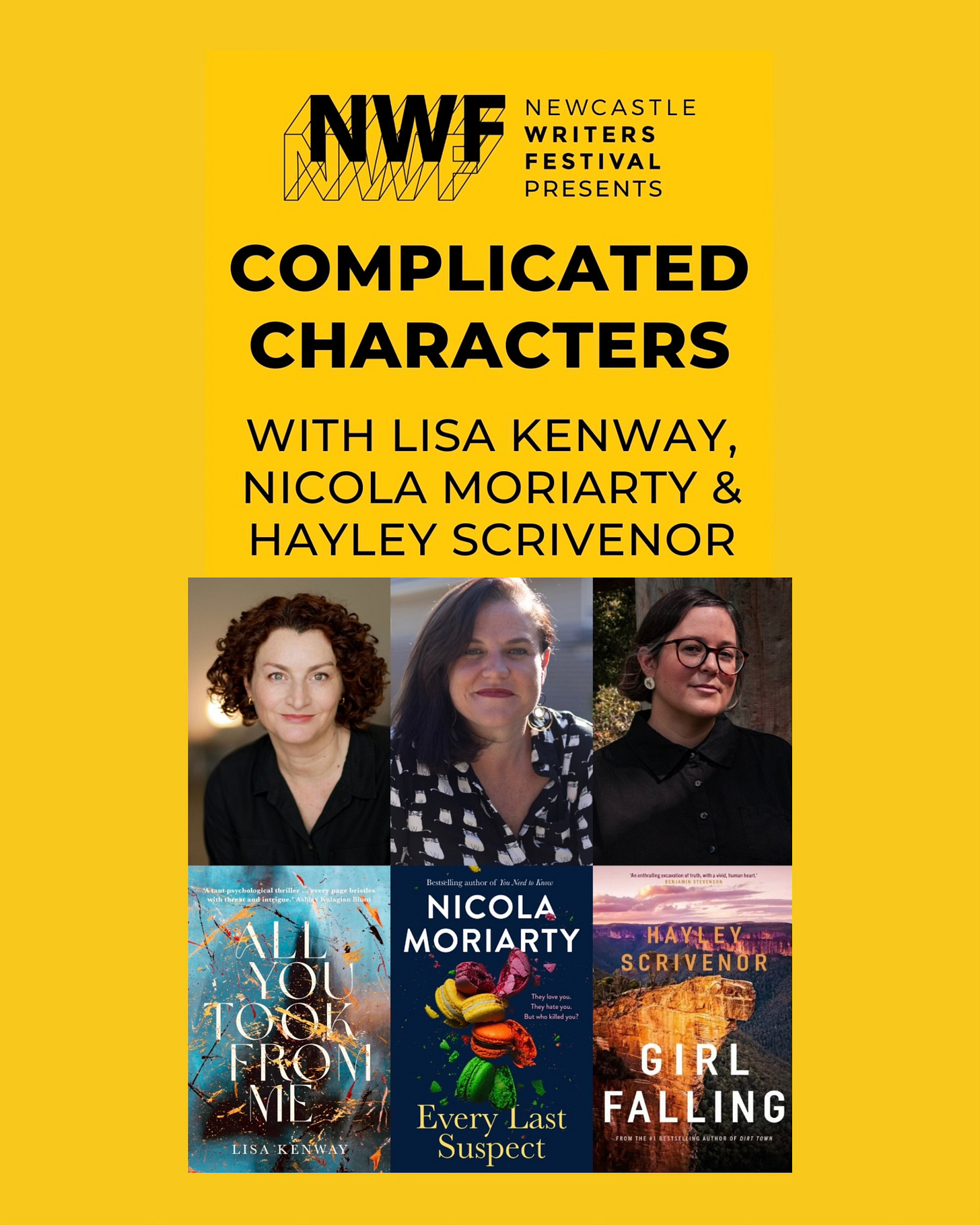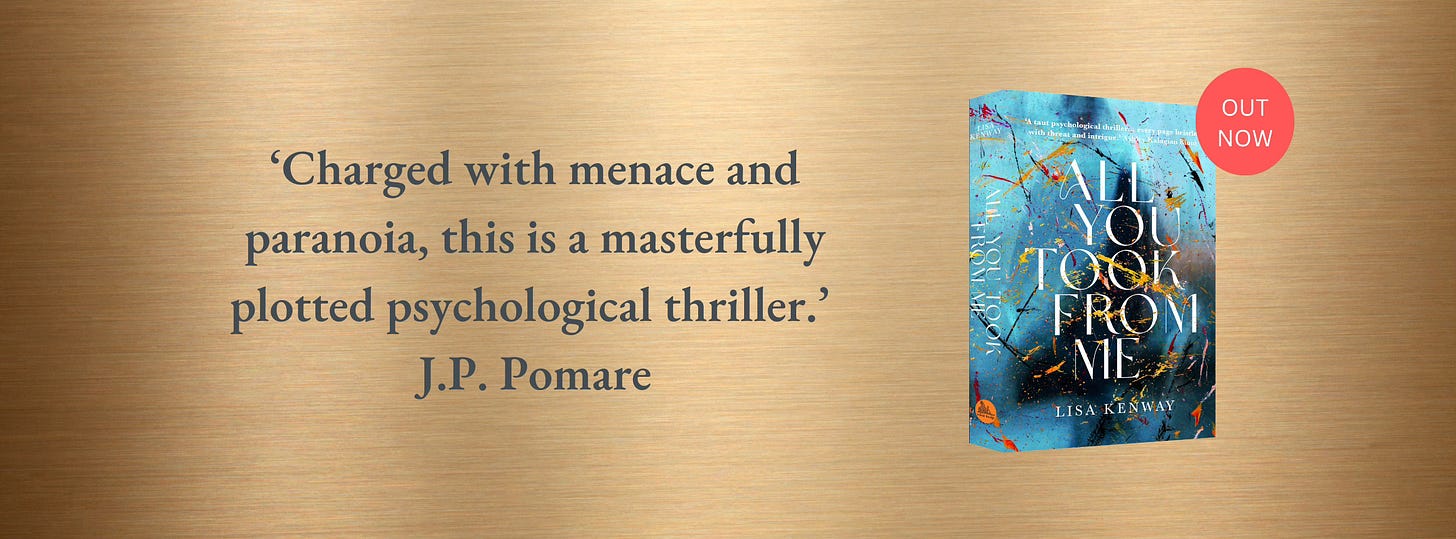Why are complex female protagonists so often deemed 'unlikable'?
And why are (mostly female) authors torn down for writing them?

We need to talk about the thorny subject of likability in fiction. In 2017, Erica Jong wrote for the BBC about the harsh way fictional women are judged, using Lena Dunham’s Girls as an example. Many others have also explored this territory. So I guess my question is why, in 2025, do many readers still require female characters to be ‘likeable’? Meanwhile male protagonists can behave as immorally as they choose without being taken to task.
As a reader, I don’t understand this attitude at all. Regardless of gender, I’m drawn to a complicated, interesting character who makes all the wrong choices, provided they’re justified. I want to be provoked, to think, to feel. Bland Pollyanna-ish characters bore me to tears, but I guess that’s why I write psychological thrillers.
Clare, the protagonist in my psychological thriller, All You Took From Me, is certainly complicated. She’s consumed by grief, socially isolated, impulsive, battling memory loss and when under pressure makes increasingly questionable choices. She’s strong, intelligent, at times prickly and fiercely independent. As a writer, I aimed to build her into a layered, believably flawed woman who finds herself in an extraordinarily difficult position. As she unravels, her actions, which she always sees as justified, sometimes amount to self-sabotage. But haven’t we all made regrettable choices in times of mental anguish?
Although responses to my novel have been largely positive (thank you to everyone who’s taken the time to write a review!), some readers have complained that they either couldn’t relate to Clare or ‘failed to warm to her’. Everyone is entitled to their opinion, but reading between the lines, I think this flavour of criticism often comes down to reader expectations, specifically that female characters should be the sort of people they feel warmly about, ideally people just like the reader. But if one of the strengths of fiction is to build empathy, do we achieve that by limiting the scope of acceptable female character traits?
I hope I’ve done enough to convince my readers to empathise with Clare, to understand why she behaves the way she does and maybe even admire her strength and tenacity. But making her likeable was never my goal. I don’t think that should be the basis on which we judge a book, a fictional character or, indeed, a woman – because clearly this double standard reflects societal expectations of women in general.
This form of criticism tends to play out in reader-oriented spaces like Goodreads. Lately, one of my favourite pastimes is looking up books that I’ve loved on Goodreads and reading their one-star reviews. Perversely, they make me feel better about my own. In the course of searching the platform, I’ve made a disturbing discovery: books by women about ‘unlikable’ women tend to have relatively low average ratings. Of course there are exceptions to the rule, but the trend is so pervasive it’s been tongue-in-cheek coined the Madievsky Rule in this 2020 article by Ruth Madievsky in LitHub.
Madievsky proposes that according to her unscientific study (there is no data on the subject), ‘3.5 stars on Goodreads is the sweet spot for contemporary literary fiction written by women about women’, while on average comparable books written by men do better. My observations suggest that this also applies to genre fiction, especially psychological thrillers.
Does it hurt sales? Possibly. On one book sales platform an early malicious one-star review tanked my novel’s rating and almost certainly put customers off buying it, but there’s not much an author – who must never engage with negative reviews – can do about that. For a fascinating read about review bombing and other problematic aspects of platforms like Goodreads, check out this article.
If, like me, you find this subject endlessly fascinating, you might be interested in this panel I’ll be appearing on at Newcastle Writers Festival on Sunday 6 April 2025 alongside bestselling authors Nicola Moriarty and Hayley Scrivener. Tickets are on sale now.
The blurb: Lisa Kenway, Nicola Moriarty and Hayley Scrivenor have crafted complicated characters who are multi-faceted, morally ambiguous, and not altogether likeable. They’ll discuss the ways in which nuanced characters blur the line between good and bad, provoke empathy, and mirror the contradictions of real life. Hosted by Abby Millerd.
I’m also appearing on a ‘Date with a Debut’ panel on Sunday 6 April at Newcastle Writers Festival alongside Zahid Gamieldien and Natasha Rai, hosted by Nick Wasiliev. It’s a free session and should be of interest to writers and readers alike.
In addition, I’ll be on two panels at Manly Writers Festival on Saturday 29 March. Check out the website for details.
I hope to see a few of you at these fabulous festivals.
And in the words of Kolina Cisero, who wrote eloquently about this topic on Substack recently, ‘Support the authors, support the publishers, and for fuck’s sake, stop calling female protagonists unlikeable. Those characters happen to be the same steely women who make art great, and I don’t want to see them going anywhere.’





I hear you Lisa! Lillian, my protagonist in The Story Thief, is also a complex female character. I've been lucky enough to get mostly very positive reviews but the negative ones have almost always taken exception with Lillian's flaws. Many readers do seem to expect more from a fictional character than they do in real life, perhaps even more than they expect of themselves ... but that's a topic for another day!